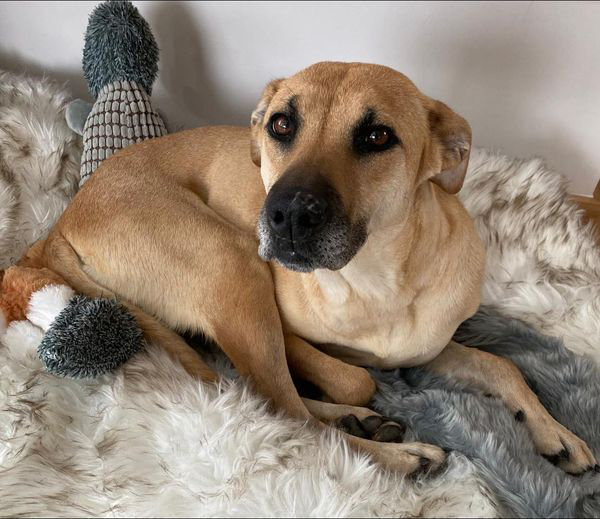
05 Oct Second Chance: Dog Dementia!
Second Chance Humane Society’s Animal Resource Center and Thrift Shops have been serving San Miguel, Ouray and Montrose Counties for 27 years. Call 626-2273 to report a lost pet, learn about adopting a homeless pet, or about the emergency response, community medical, spay/neuter, volunteer, or other services.
View shelter pets and services online: www.adoptmountainpets.org.
Second Chance veterinary clinic is open Tuesday, Wednesday, and Friday. Call (970) 626-9713 or email clinic@adoptmountainpets.org
Go here for more options from Second Chance.
Go here for more on Dr. Shari DePauw of Second Chance. Veterinary services are available.

We love old dogs. They’re calm, trained, loyal, and wise. Although they sometimes need a bit more care for age-related ailments, they are worth it. The physical challenges of age are easier for many families to understand and manage than the mental changes in their elderly dog.
It’s heartbreaking when your beloved old dog goes outside one day and doesn’t know how to return to the house. She stands in the yard until someone brings her back. She starts having accidents. She doesn’t recognize people she’s known forever. She forgets things she was taught as a puppy. It’s puzzling when she paces and barks at nonexistent threats.
Some dogs start showing canine cognitive dysfunction (CCD) as early as 8 years old. By the time they are 15, almost all dogs will show some signs of impairment. The signs can include disorientation (wandering around like he is lost, confused about surroundings, or failing to recognize people he knows), interaction changes (showing less interest in being social, not wanting to be petted, spending time away from your family), becoming needier, disrupted sleep/wake cycles, house soiling, pacing the floor, showing fear of familiar objects or people, and activity changes.
While there is no cure for CCD, there are things you can do to make life easier. Your veterinarian can suggest medications and nutritional supplements that can be helpful to dogs with dementia. Other suggestions include getting them to exercise more, buying interactive toys, and teaching the dog new skills to help with memory and learning.
It might help your elderly dog to take them on walks (at their pace, not yours), keep a routine to lessen their anxiety, remain calm when the dog soils the carpet or wakes you up in the middle of the night, and keep the layout of your home the same. Elderly dogs should always find their food and water bowl in the same place.
As you navigate your dog’s limitations, you will need to consider when it’s time to set them free. Maintaining the human-animal bond should be the most important goal at the end of any dog’s life. Quality of life should be considered when they cannot recognize their loved ones and are frightened by the world around them. At some point, euthanasia may be the kindest decision. When struggling with such a tough decision, know that you can contact Second Chance’s veterinary services for euthanasia consultation and options.

Coraline
My name is Coraline, and I’m still a very young girl. We can have a long and happy life together. I do best with women, and I really don’t like cats. I’m sweet, smart, affectionate, active, and healthy. I like to go on long walks and I’m obsessed with playing ball. I will make a great companion for you and would love another dog friend.
AND… To continue the Second Chance Highlights section, we want to share the following:
Meet Tara Cleveland, Shelter Manager
One of the most challenging roles at any shelter is that of the Shelter Manager. It’s a combination of animal welfare work, admin work, event planning, employee hiring and development, volunteer management, community outreach, policy development, communications, and advocacy. Oh, and in a small shelter such as Second Chance, it can also include cleaning, feeding, poop scooping, and anything else that needs to be done on any given day to support staff and volunteers. Having the right person in the job means our mission of helping homeless pets is fulfilled and expanded, while also making Second Chance an awesome place to work. We’d like to introduce you to the person we’ve entrusted with this role: Tara Cleveland.
Tara is from Kansas City and recently joined us here in Ridgway. She has worked with animals in various capacities since she was a teenager. She started by volunteering weekends at a backyard animal shelter, worked for a vet clinic for 3 years, and was a groomer for a year. Most recently, she worked for the largest nonprofit animal shelter in Kansas City for 5 years in a variety of roles.
Tara loves to be outside, doing any activity she can do with her 14-year-old dog. She especially enjoys hiking, kayaking, and biking.
When asked her goals for Second Chance, Tara said, “Using my experience and education, I hope to be a forward-thinking, strategic, and mission-driven leader for Second Chance. My priority is to positively impact as many lives as possible. I am so excited to join this incredible community, and I am looking forward to learning as much as I can.”
Kelly Goodin, Executive Director adds, “We are all excited to have Tara join our team. Her experience, problem-solving and communication skills, not to mention her passion and enthusiasm for the field of animal welfare, make her the right fit for this critical role in our organization. Her background will allow us to continue developing our signature model shelter programs and services.”


Sorry, the comment form is closed at this time.